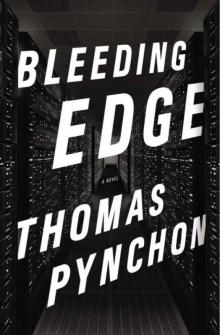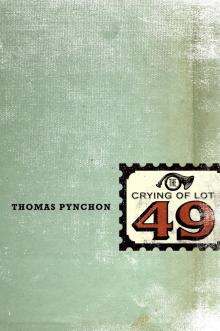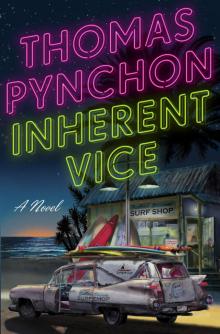- Home
- Thomas Pynchon
V. Page 2
V. Read online
Page 2
Mrs. Buffo, poised on her rampart like the trumpeter of Cracow, took the full impact of the onslaught, toppling over backwards into an ice-tub as the first wave came hurtling over the bar. Ploy, hands outstretched, was propelled over the top. He caught on to one of the tap handles and simultaneously his shipmates let go; his momentum carried him and the handle in a downward arc: beer began to gush from the foam rubber breast in a white cascade, washing over Ploy, Mrs. Buffo and two dozen sailors who had come around behind the bar in a flanking action and who were now battering one another into insensibility. The group who had carried Ploy over spread out and tried to corner more beer taps. Ploy’s leading petty officer was on hands and knees holding Ploy’s feet, ready to pull them out from under him and take his striker’s place when Ploy had had enough. The Impulsive detachment in their charge had formed a flying wedge. In their wake and through the breach clambered at least sixty more slavering bluejackets, kicking, clawing, sidearming, bellowing uproariously; some swinging beer bottles to clear a path.
Profane sat at the end of the bar, watching hand-tooled sea boots, bell-bottoms, Levi’s with rolled-up cuffs; every now and again a drooling face at the end of a fallen body; broken beer bottles, tiny sawdust storms.
Soon he looked over; Paola was there, arms around his leg, cheek pressed against the black denim.
“It’s awful,” she said.
“Oh,” said Profane. He patted her head.
“Peace,” she sighed. “Isn’t that what we all want, Benny? Just a little peace. Nobody jumping out and biting you on the ass.”
“Hush,” said Profane, “look: someone has just walloped Dewey Gland in the stomach with his own guitar.”
Paola murmured against his leg. They sat quiet, without raising their eyes to watch the carnage going on above them. Mrs. Buffo had undertaken a crying jag. Inhuman blubberings beat against and rose from behind the old imitation mahogany of the bar.
Pig had moved aside two dozen beer glasses and seated himself on a ledge behind the bar. In times of crisis he preferred to sit in as voyeur. He gazed eagerly as his shipmates grappled shoat-like after the seven geysers below him. Beer had soaked down most of the sawdust behind the bar: skirmishes and amateur footwork were now scribbling it into alien hieroglyphics.
Outside came sirens, whistles, running feet. “Oh, oh,” said Pig. He hopped down from the shelf, made his way around the end of the bar to Profane and Paola. “Hey, ace,” he said, cool and slitting his eyes as if the wind blew into them. “The sheriff is coming.”
“Back way,” said Profane.
“Bring the broad,” said Pig.
The three of them ran broken-field through a roomful of teeming bodies. On the way they picked up Dewey Gland. By the time the Shore Patrol had crashed into the Sailor’s Grave, night sticks flailing, the four found themselves running down an alley parallel to East Main. “Where we going,” Profane said. “The way we’re heading,” said Pig. “Move your ass.”
II
Where they ended up finally was an apartment in Newport News, inhabited by four WAVE lieutenants and a switchman at the coal piers (friend of Pig’s) named Morris Teflon, who was a sort of house father. The week between Christmas and New Year’s Day was spent drunk enough to know that’s what they were. Nobody in the house seemed to object when they all moved in.
An unfortunate habit of Teflon’s drew Profane and Paola together, though neither wanted that. Teflon had a camera: Leica, procured half-legally overseas by a Navy friend. On weekends when business was good and guinea red wine splashing around like the wave from a heavy merchantman, Teflon would sling the camera round his neck and go a-roving from bed to bed, taking pictures. These he sold to avid sailors at the lower end of East Main.
It happened that Paola Hod, nee Maijstral, cast loose at her own whim early from the security of Pappy Hod’s bed and late from the half-home of the Sailor’s Grave, was now in a state of shock which endowed Profane with all manner of healing and sympathetic talents he didn’t really possess.
“You’re all I have,” she warned him. “Be good to me.” They would sit around a table in Teflon’s kitchen: Pig Bodine and Dewey Gland facing them one each like partners at bridge, a vodka bottle in the middle. Nobody would talk except to argue about what they would mix the vodka with next when what they had ran out. That week they tried milk, canned vegetable soup, finally the juice from a dried-up piece of watermelon which was all Teflon had left in the refrigerator. Try to squeeze a watermelon into a small tumbler sometime when your reflexes are not so good. It is next to impossible. Picking the seeds out of the vodka proved also to be a problem, and resulted in a growing, mutual ill-will.
Part of the trouble was that Pig and Dewey both had eyes for Paola. Every night they would approach Profane as a committee and ask for seconds.
“She’s trying to recover from men,” Profane tried to say. Pig would either reject this or take it as an insult to Pappy Hod his old superior.
Truth of it was Profane wasn’t getting any. Though it became hard to tell what Paola wanted.
“What do you mean,” Profane said. “Be good to you.”
“What Pappy Hod wasn’t,” she said. He soon gave up trying to decode her several hankerings. She would on occasion come up with all sorts of weird tales of infidelity, punchings-in-the-mouth, drunken abuse. Having clamped down, chipped, wire-brushed, painted and chipped again under Pappy Hod for four years Profane would believe about half. Half because a woman is only half of something there are usually two sides to.
She taught them all a song. Learned from a para on French leave from the fighting in Algeria:
Demain le noir matin,
Je fermerai la porte
Au nez des années mortes;
J’irai par les chemins.
Je mendierai ma vie
Sur la terre et sur l’onde,
Du vieux au nouveau monde . . .
He had been short and built like the island of Malta itself: rock, an inscrutable heart. She’d had only one night with him. Then he was off to the Piraeus.
Tomorrow, the black morning, I close the door in the face of the dead years. I will go on the road, bum my way over land and sea, from the old to the new world. . . .
She taught Dewey Gland the chord changes and so they all sat around the table of Teflon’s wintry kitchen, while four gas flames on the stove ate up their oxygen; and sang, and sang. When Profane watched her eyes he thought she dreamed of the para—probably a man-of-no-politics as brave as anyone ever is in combat: but tired, was all, tired of relocating native villages and devising barbarities in the morning as brutal as’d come from the F.L.N. the night before. She wore a Miraculous Medal round her neck (given to her, maybe, by some random sailor she reminded of a good Catholic girl back in the States where sex is for free—or for marriage?). What sort of Catholic was she? Profane, who was only half Catholic (mother Jewish), whose morality was fragmentary (being derived from experience and not much of it), wondered what quaint Jesuit arguments had led her to come away with him, refuse to share a bed but still ask him to “be good.”
The night before New Year’s Eve they wandered away from the kitchen and out to a kosher delicatessen a few blocks away. On returning to Teflon’s they found Pig and Dewey gone: “Gone out to get drunk,” said the note. The place was lit up all Xmasy, a radio turned to WAVY and Pat Boone in one bedroom, sounds of objects being thrown in another. Somehow the young couple had wandered into a darkened room with this bed in it.
“No,” she said.
“Meaning yes.”
Groan, went the bed. Before either of them knew it:
Click, went Teflon’s Leica.
Profane did what was expected of him: came roaring off the bed, arm terminating in a fist. Teflon dodged it easily. “Now, now,” he chuckled.
Outraged privacy was not
so important; but the interruption had come just before the Big Moment.
“You don’t mind,” Teflon was telling him. Paola was hurrying into clothes.
“Out in the snow,” Profane said, “is where that camera, Teflon, is sending us.”
“Here:” opened the camera, handed Profane the film, “you’re going to be a horse’s ass about it.”
Profane took the film but couldn’t back down. So he dressed and topped off with the cowboy hat. Paola had put on a Navy greatcoat, too big for her.
“Out,” Profane cried, “in the snow.” Which in fact there was. They caught a ferry over to Norfolk and sat topside drinking black coffee out of paper cups and watching snow-shrouds flap silent against the big windows. There was nothing else to look at but a bum on a bench facing them, and each other. The engine thumped and labored down below, they could feel it through their buttocks, but neither could think of anything to say.
“Did you want to stay,” he asked.
“No, no,” she shivered, a discreet foot of worn bench between them. He had no impulse to bring her closer. “Whatever you decide.”
Madonna, he thought, I have a dependent now.
“What are you shivering for. It’s warm enough in here.”
She shook her head no (whatever that meant), staring at the toes of her galoshes. After a while Profane got up and went out on deck.
Snow falling lazy on the water made 11:00 P.M. look like twilight or an eclipse. Overhead every few seconds a horn sounded off to warn away anything on collision course. But yet as if there were nothing on the roads after all but ships, untenanted, inanimate, making noises at one another which meant nothing more than the turbulence of the screws or the snow-hiss on the water. And Profane all alone in it.
Some of us are afraid of dying; others of human loneliness. Profane was afraid of land or seascapes like this, where nothing else lived but himself. It seemed he was always walking into one: turn a corner in the street, open a door to a weather-deck and there he’d be, in alien country.
But the door behind him opened again. Soon he felt Paola’s gloveless hands slipped under his arms, her cheek against his back. His mental eye withdrew, watching their still-life as a stranger might. But she didn’t help the scene be any less alien. They kept like that till the other side, the ferry entered the slip, and chains clanked, car ignitions whined, motors started.
They rode the bus into town, wordless; alit near the Monticello Hotel and set out for East Main to find Pig and Dewey. The Sailor’s Grave was dark, the first time Profane could remember. The cops must have closed it up.
They found Pig next door in Chester’s Hillbilly Haven. Dewey was sitting in with the band. “Party, party,” cried Pig.
Some dozen ex-Scaffold sailors wanted a reunion. Pig, appointing himself social chairman, decided on the Susanna Squaducci, an Italian luxury liner now in the last stages of construction in the Newport News yards.
“Back to Newport News?” (Deciding not to tell Pig about the disagreement with Teflon.) So: yo-yoing again.
“This has got to cease,” he said but nobody was listening. Pig was off dancing the dirty boogie with Paola.
III
Profane slept that night at Pig’s place down by the old ferry docks, and he slept alone. Paola had run into one of the Beatrices and gone off to stay the night with her, after promising demurely to be Profane’s date at the New Year’s party.
Around three Profane woke up on the kitchen floor with a headache. Night air, bitter cold, seeped under the door and from somewhere outside he could hear a low, persistent growl. “Pig,” Profane croaked. “Where you keep the aspirin.” No answer. Profane stumbled into the other room. Pig wasn’t there. The growl outside turned more ominous. Profane went to the window and saw Pig down in the alley, sitting on his motorcycle and racing the engine. Snow fell in tiny glittering pinpoints, the alley held its own curious snowlight: turning Pig to black-and-white clown’s motley and ancient brick walls, dusted with snow, to neutral gray. Pig had on a knitted watch cap, pulled down over his face to the neck so that his head showed up as a sphere of dead black. Engine exhaust roiled in clouds around him. Profane shivered. “What are you doing, Pig,” he called. Pig didn’t answer. The enigma or sinister vision of Pig and that Harley-Davidson alone in an alley at three in the morning reminded Profane too suddenly of Rachel, whom he didn’t want to think about, not tonight in the bitter cold, with a headache, with snow slipping into the room.
Rachel Owlglass had owned, back in ’54, this MG. Her Daddy’s gift. After giving it its shakedown cruise in the region around Grand Central (where Daddy’s office was), familiarizing it with telephone poles, fire hydrants and occasional pedestrians, she brought the car up to the Catskills for the summer. Here, little, sulky and voluptuous, Rachel would gee and haw this MG around Route 17’s bloodthirsty curves and cutbacks, sashaying its arrogant butt past hay wagons, growling semis, old Ford roadsters filled to capacity with crewcut, undergraduate gnomes.
Profane was just out of the Navy and working that summer as assistant salad man at Schlozhauer’s Trocadero, nine miles outside Liberty, New York. His chief was one Da Conho, a mad Brazilian who wanted to go fight Arabs in Israel. One night near the opening of the season a drunken Marine had showed up in the Fiesta Lounge or bar of the Trocadero, carrying a .30-caliber machine gun in his AWOL bag. He wasn’t too sure how he had come by the weapon exactly: Da Conho preferred to think it had been smuggled out of Parris Island piece by piece, which was how the Haganah would do it. After a deal of arguing with the bartender, who also wanted the gun, Da Conho finally triumphed, swapping for it three artichokes and an eggplant. To the mezuzah nailed up over the vegetable reefer and the Zionist banner hanging in back of the salad table Da Conho added this prize. During the weeks that followed, when the head chef was looking the other way, Da Conho would assemble his machine gun, camouflage it with iceberg lettuce, watercress and Belgian endive, and mock-strafe the guests assembled in the dining room. “Yibble, yibble, yibble,” he would go, squinting malevolent along the sights, “got you dead center, Abdul Sayid. Yibble, yibble, Muslim pig.” Da Conho’s machine gun was the only one in the world that went yibble, yibble. He would sit up past four in the morning cleaning it, dreaming of lunar-looking deserts, the sizzle of chang music, Yemenite girls whose delicate heads were covered with white kerchiefs, whose loins ached with love. He wondered how American Jews could sit vainglorious in that dining room meal after meal while only halfway round the world the desert shifted relentless over corpses of their own. How could he tell soulless stomachs? Harangue with oil and vinegar, supplicate with heart of palm. The only voice he had was the machine gun’s. Could they hear that, can stomachs listen: no. And you never hear the one that gets you. Aimed perhaps at any alimentary canal in a Hart Schaffner & Marx suit which vented lewd gurgles at the waitresses who passed, that gun was an object only, pointing where any suitable unbalance force might direct it: but which belt buckle was Da Conho taking a lead on: Abdul Sayid, the alimentary canal, himself? Why ask. He knew no more than that he was a Zionist, suffered, was confused, was daft to stand rooted sock-top deep in the loam of any kibbutz, a hemisphere away.
Profane had wondered then what it was with Da Conho and that machine gun. Love for an object, this was new to him. When he found out not long after this that the same thing was with Rachel and her MG, he had his first intelligence that something had been going on under the rose, maybe for longer and with more people than he would care to think about.
He met her through the MG, like everyone else met her. It nearly ran him over. He was wandering out the back door of the kitchen one noon carrying a garbage can overflowing with lettuce leaves Da Conho considered substandard when somewhere off to his right he heard the MG’s sinister growl. Profane kept walking, secure in a faith that burdened pedestrians have the right-of-way. Next thing he knew he was clipped in the re
ar end by the car’s right fender. Fortunately, it was only moving at 5 mph—not fast enough to break anything, only to send Profane, garbage can and lettuce leaves flying ass over teakettle in a great green shower.
He and Rachel, both covered with lettuce leaves, looked at each other, wary. “How romantic,” she said. “For all I know you may be the man of my dreams. Take that lettuce leaf off your face so I can see.” Like doffing a cap—remembering his place—he removed the leaf.
“No,” she said, “you’re not him.”
“Maybe,” said Profane, “we can try it next time with a fig leaf.”
“Ha, ha,” she said and roared off. He found a rake and started collecting the garbage into one pile. He reflected that here was another inanimate object that had nearly killed him. He was not sure whether he meant Rachel or the car. He put the pile of lettuce leaves in the garbage can and dumped the can back of the parking lot in a small ravine which served the Trocadero for a refuse pile. As he was returning to the kitchen Rachel came by again. The MG’s adenoidal exhaust sounded like it probably could be heard all the way to Liberty. “Come for a ride, hey Fatso,” she called out. Profane reckoned he could. It was a couple hours before he had to go in to set up for supper.
Five minutes out on Route 17 he decided if he ever got back to the Trocadero unmaimed and alive to forget about Rachel and only be interested thenceforth in quiet, pedestrian girls. She drove like one of the damned on holiday. He had no doubt she knew the car’s and her own abilities, but how did she know, for instance, when she passed on a blind curve of that two-lane road, that the milk truck approaching would be just far enough away for her to whip back into line with a whole sixteenth of an inch to spare?
He was too afraid for his life to be, as he normally was, girl-shy. He reached over, opened her pocketbook, found a cigarette, lit it. She didn’t notice. She drove single-minded and unaware there was anyone next to her. She only spoke once, to tell him there was a case of cold beer in the back. He dragged on her cigarette and wondered if he had a compulsion to suicide. It seemed sometimes that he put himself deliberately in the way of hostile objects, as if he were looking to get schlimazzeled out of existence. Why was he here anyway? Because Rachel had a nice ass? He glanced sidewise at it on the leather upholstery, bouncing, synched with the car; watched the not-so-simple nor quite harmonic motion of her left breast inside the black sweater she had on. She pulled in finally at an abandoned rock quarry. Irregular chunks of stone were scattered around. He didn’t know what kind, but it was all inanimate. They made it up a dirt road to a flat place forty feet above the floor of the quarry.

 Mason & Dixon
Mason & Dixon Against the Day
Against the Day Uncollected Works
Uncollected Works Bleeding Edge
Bleeding Edge Gravity's Rainbow
Gravity's Rainbow The Crying of Lot 49
The Crying of Lot 49 V.
V. Inherent Vice
Inherent Vice Vineland
Vineland